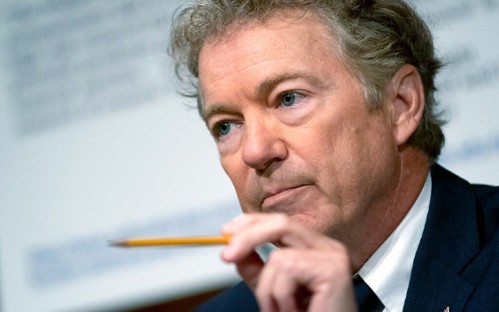The critics on Capitol Hill are mostly attacking the bill for its lack of spending cuts for a federal government $36 trillion in debt. For that reason, it should include much more, they argue.
 Sen. Rand Paul (R-Kentucky) has called the bill “wimpy and anemic.”
Sen. Rand Paul (R-Kentucky) has called the bill “wimpy and anemic.”
Sen. Ron Johnson (R-Wisconsin) says it doesn’t do enough for debt reduction.
Some GOP lawmakers in the House voted for its passage but did so with great reservation, Tom Tiffany (R-Wisconsin) being one of them.
Tiffany said on American Family Radio Thursday that he hopes to see Senate changes that will further reduce spending.
Where are the DOGE cuts, some also ask? The Department of Government Efficiency made headlines and enemies for exposing spending waste and abuse, and its defenders want those cuts codified into law.
The House passed the bill 215-214 with one Republican voting present and two not voting.

Now it’s in the hands of the Senate where Republicans have another slim majority.
House Speaker Mike Johnson (R-Louisiana), in a weekend visit with the Washington Watch program, said there’s a misunderstanding around some of the concerns.
“You have to remember how the process works. DOGE was looking at discretionary savings. There are two categories of federal spending. One is mandatory spending, one is discretionary. The reconciliation package is dealing with the first category, not the latter. So, it was not possible, literally under the rules of the Senate, for us to put DOGE cuts in large measure in the reconciliation package,” he told show host Tony Perkins.
That doesn’t mean DOGE cuts won’t happen but they’ll come through a different mechanism, Johnson said.
 President Donald Trump has recently submitted his first “rescission” package for lawmakers’ consideration.
President Donald Trump has recently submitted his first “rescission” package for lawmakers’ consideration.
The rescission process applies to discretionary spending and allows for Congress to revoke or reassign – to claw back – funds previously designated to federal agencies that has not been spent or that Congress wishes to spend differently.
The administration can submit rescission requests. Congress has the authority to approve or reject the requests through the Congressional Budget and Impoundment Control Act of 1974.
By rule, most of the DOGE cuts have to be separate, Johnson said.
Not all response to the House bill is doom and gloom.
Codifying Trump’s 2017 tax cuts
Jenny Beth Martin, of Tea Party Patriots Action, told AFN that there are some "excellent components" in the bill.
"The current tax rates which are the tax rates from 2017 will not just be extended they will be made permanent and that ensures that Americans do not see tax increases at the end of the year," she said. "It also has no tax on tips and no tax on overtime which I know helps people who are working in industries that rely heavily on tips or on overtime."

There's also an additional deduction for Social Security recipients.
"So, on the tax side there are very good pieces, but at Tea Party Patriots Action we always want a lot of spending cuts, and there are good spending cuts in the bill, we just would like to see a little bit more, especially as it relates to the Green New Deal portions," said Martin. "They do repeal some of the Green New Deal but not all. We think all of that needs to go away."
She does have concerns about plans to pay $1,000 for every new baby born in the U.S.
“I'm very concerned that if it starts at $1,000 this year and a few years from now it'll be $5,000 or $10,000, and it'll just keep growing from there because as we know entitlements never go away,” she said.
'There's more that can be done'
Tiffany, a Freedom Caucus member, told show host Jenna Ellis that in spite of his concerns, there are good things in the bill.
The Freedom Caucus, a group of far-right fiscal conservatives within the House, was able to band together and get “significant concessions” in the bill, mostly relating to previous administration’s Inflation Reduction Act where cuts total about a half trillion dollars, he said.
“That was really, I thought, a significant win,” Tiffany said.
 Tiffany also praised the House inclusion of work requirements for the able-bodied among the Medicaid recipients.
Tiffany also praised the House inclusion of work requirements for the able-bodied among the Medicaid recipients.
But he hopes a bill with more bite emerges from the Senate.
“There’s more that can be done. There’s plenty of opportunity in the Senate, and I hope they’re successful at that. I just hope they don’t backslide,” he said.
The House has been waiting on Trump’s requests.
“It took a while to do it. Remember, there was no playbook for what DOGE and Elon Musk were doing. They had to create them as they went. They had to qualify then quantify. Now we’re ready to codify the changes,” Johnson said.
The first rescissions package from the White House covers more than $9 billion in cuts, Johnson said.
First up: USAID, NPR, PBS
Included in the first package are proposed cuts to the United States Agency for International Development (USAID) and cuts to National Public Radio (NPR) and the Public Broadcasting System (PBS).
When DOGE got rolling in the spring USAID became the poster child agency for waste and inefficiency.
 Defenders of USAID worked to debunk claims that it helped fund a transgender symphony in Colombia, a DEI musical in Ireland, and a transgender comic book in Peru.
Defenders of USAID worked to debunk claims that it helped fund a transgender symphony in Colombia, a DEI musical in Ireland, and a transgender comic book in Peru.
A fact check by The Oakland Press says each of those claims are false. However, the check notes that these initiatives were in fact funded by U.S. taxpayers, though the money originating from State Department grants, just not USAID specifically.
“A lot of analysis has gone into this, and there's a lot of a lot of public scrutiny, rightfully, that has been applied to this. I mean, this is one of the things that's so revolutionary about what DOGE has accomplished, what Elon accomplished with his with his efforts,” Johnson said.







